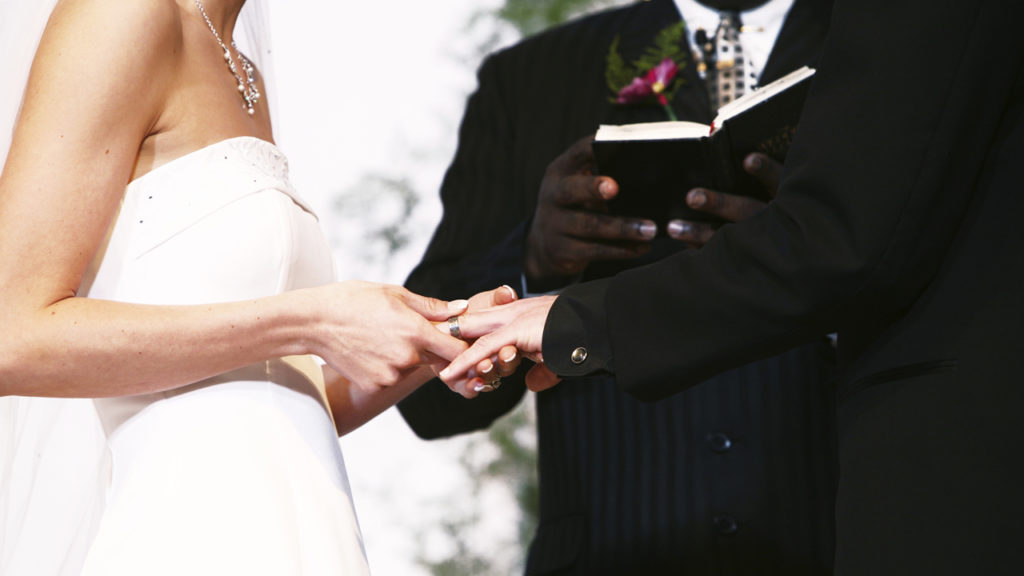After a series of relationships and messy breakups, Leila, 22, is now happy to be living with Mike, her unofficial fiancé. They know they’ll marry each other, but they don’t have a date set, nor has there been an official proposal. Mike, 27, spent most of his 20s working at Starbucks and now works night shift as a supervisor at a homeless shelter because he wanted to find something more meaningful. He is an artist, and he looks the part: a full red beard, black button stud earrings on both ears and a beanie hat with a visor covering disheveled dirty-blond hair.
As a believer in Christ, Mike believes that marriage is “a spiritual covenant.” Yet he adds, “Marriage is the same thing as a soul mate…. Marriage to me is not a ceremony…. It’s a spiritual covenant between you and the other person. No one else. No one else involved. If no one’s there, I don’t care. If someone’s, like, ordained or not to officially marry you — I don’t care! I don’t give a s*** if you’re ordained. I’m married because I say I’m married, and [if] we say that we’re married, then we’re married.”
So do Mike and Leila consider themselves married? Well, actually, they do. Mike explains:
To me we are [married]. I don’t care that you didn’t get to come to a ceremony and have free food…. Right now, with my current relationship going, it’s just understood. We’re just like, ‘All right, you’re my soul mate — cool.’ Whatever. It’s like, did we have a ceremony yet with a bunch of people and raise some money to have a little thing? No. But if someone said, ‘Who’s your soul mate?’ Who would she say? She would say me, and I would say her…. I don’t care about a big show. I don’t care about who knows what, who thinks what — or anything. And I mean I’m a believer; I’m a Christian. And my whole life it’s been ‘You don’t [mockingly mumbles unintelligible sounds]’ and all this stuff. And ‘You’re not married.’ It’s like ‘OK, well then tell me what marriage is. Why don’t we talk about what marriage is?‘ And then we’ll go from there.”
It’s not surprising that young adults like Mike and Leila are skeptical of marriage as a public institution. Authenticity is a buzzword for us Millennials, and we’ve seen plenty of marriages where people say that they love each other and promise to love each other for a lifetime and then divorce and repeat those same vows multiple times to multiple people. That’s authentic? Sure seems phony to us. We want the real thing, and many people in our generation notice that the wedding, the ring, the wedding certificate often don’t bring the real thing. So, they conclude, marriage is not a public institution. It’s a private, spiritual union of soul mates.
Skepticism about marriage as a public institution is certainly pervasive — and not just among non-Christians. Some of the self-identified Christian young adults we interviewed for a research project last summer voiced sentiments similar to Mike and Leila: They like the idea of being spiritual but see institutionalized religion as the Grinch — they wouldn’t touch it with a 10-foot pole. For them, what matters is internal, not external. These same young people apply this logic to marriage and ask, “If I love my girlfriend/boyfriend, why do we need to have a ceremony to show that love? If we say that we’re married, we’re married. What matters is that in our hearts we love each other, not whether we have a ceremony.” Just as they’re comfortable with spirituality but wary of religion, so they’re comfortable with being soul mates but skeptical of marriage.
To Mate a Soul or to Marry a Spouse?
So why isn’t a soul mate good enough? Why does marriage matter?
To answer these questions, let’s first ponder two different words: soul mate and spouse.
Soul mate is an interesting term. For one thing, it suggests that love is exclusively a “soul” affair. Type “soul mate” into Google images, and among the images you’ll find are a faceless couple whose touch ignites a starburst of energy and another faceless couple each putting a hand on the other’s heart while a force of rainbow light jolts through them. The word has a light quality to it: airy, ethereal, spiritual. Moreover, as the images hint, the word suggests that soul mates find each other through some mysterious rush of romantic energy that impels them into each others arms — the impact of the force so strong that it catapults them forever after into the land of everlasting intimacy. What impels their souls toward each other and sends them careening into this land of everlasting happiness is not so much a decision as it is a force beyond their control. “It just happens” — and next thing you know, you’re sharing an apartment with each other.
Contrast this with the word spouse. Our dictionary tells us that the etymological roots of the word come from the Latin word spondere, which means “to promise solemnly, betroth.” The word has weightiness to it. It suggests finality, purpose, solemnity. The roots of the word suggest that two people become spouses not so much by a fate beyond their control, but by a solemn promise to love each other for the rest of their lives.
How do people usually make solemn promises? Historically, through ritual and ceremony. Why? Because we are soul and body. Whenever anything momentous takes place — whether a birthday party or a funeral or a Super Bowl victory — we surround it with ritual and ceremony: We blow birthday candles; we buy flowers and bury the dead; we have a parade for the Super Bowl champions. The same has historically been true of a wedding: To reflect the momentous reality that two persons are becoming one flesh, we have developed rituals and ceremonies that incarnate this living reality.
This is not arbitrary. We do this because our soul and body are inextricably intertwined so that, as Peter Kreeft said, “No pervasive feature of either body or soul is insulated from the other; every sound in the soul echoes in the body, and every sound in the body echoes in the soul.” In a wedding ceremony, the inner chorus of love belts out in the spoken words “I, David, take you, Amber, to be my wife” and is dramatized in the placing of the ring upon the finger; conversely, the placing of the ring upon the finger reinforces to the soul that, indeed, “I, David, take you, Amber, to be my wife.”
Because the human person is a psychosomatic unity, we cannot help but surround the decisive commitment of lifelong love with the great fanfare of ceremony. It doesn’t so much matter whether one spends $40,000 or $400 on the ceremony. What matters is the couple publicly consents to be married to each other. The wedding rituals and ceremony are not mere trivial additions. They surround the marriage with public meaning and give love flesh.
Think of it this way: A couple is not content to merely think in their minds, How I love your soul! No, their love takes on “flesh” through intimate acts like holding hands, kissing and having sex. In the same way, a couple’s love is “enfleshed” through the solemn ritual of a wedding. If the human person were only a soul, then all of this kissing and exchanging rings and making love would be absurd and impossible (can two souls kiss?). But the human person is soul and body; therefore, we kiss and exchange rings and make love.
Here, one might protest: “But why does it have to be in public? Why can’t a couple just seal the deal between themselves?” Perhaps a couple could follow their own elaborate ceremony with no one else in attendance. But one of the main points of having a ceremony is to acknowledge that the couple is stepping into a drama dramatically bigger than their own story. For the non-Christian couple, at the minimum this is an acknowledgement that they did not make marriage and that they are not the only ones affected by their relationship.
For the Christian, it’s an acknowledgement that marriage is a gift and call from God. All Christians propose that the vocation to marriage is a vocation to imitate the relationship between Christ and the church. And can we really imagine Christ insisting on a private wedding feast with His church? Just as it would be absurd for a person to baptize himself — one of the main points is to publicly declare that you are now part of Christ — so it would miss the point if a couple were to insist on a completely private wedding. Of course, the Catholic tradition goes even farther than this symbolic meaning by elevating it to the level of sacrament. It insists that through the couple’s public consent and subsequent consummation, Christ empowers the couple with his very life-giving grace. But whatever one’s particular Christian persuasion may be, Christians of all stripes recognize that marriage is infinitely bigger than their own private relationship and therefore demands public recognition and celebration.
That Good Things May Run Wild
Marriage matters because it reflects the fact that we are both physical and spiritual beings, and it transcends our own particular story. But marriage also differs from a cohabiting soul mate relationship (even a committed one!) because it gives order to love.
G.K. Chesterton says of Christianity that the more he considered it, “the more I found that while it had established a rule and order, the chief aim of that order was to give room for good things to run wild.” The same is true with the rules and rituals of marriage. It creates clear, definite boundaries, and lets good things like love and intimacy flourish within those boundaries. In other words, the vow to love and cherish one’s spouse “for better or worse, for richer or poorer, in sickness and in health, until death do us part,” is at the same time one of the most constricting promises one could ever make — and one of the most liberating promises. It’s constricting because I can’t love other people in the uniquely marital way, but it’s liberating in that love is allowed to grow wild within those boundaries.
This is no accident. Love manifests itself precisely in the drive to give everything, to sacrifice everything for the other. Love is not love unless it gives everything. As Chesterton notes, some people
appear to imagine that the idea of constancy was a yoke mysteriously imposed on mankind by the devil, instead of being, as it is, a yoke consistently imposed by all lovers on themselves…. It is the nature of love to bind itself, and the institution of marriage merely paid the average man the compliment of taking him at his word. Modern sages offer to the lover, with an ill-flavoured grin, the largest liberties and the fullest irresponsibility; but they do not write his oath upon the heavens, as the record of his highest moment. They give him every liberty except the liberty to sell his liberty, which is the only one that he wants.”
One of the problems of cohabitation is that it deprives a man and woman of this “highest moment,” of standing before God and witnesses and declaring, “Here I take my stand. I will love and cherish you for the rest of my life; I give myself to you and to none other.” It deprives a couple the opportunity of publicly and unabashedly elevating their love — a love that longs to last — to the dignity of betrothed love. Without a clear commitment of betrothal, their love is thus endangered, left vulnerable to the vicissitudes of mood swings and recessions and personal tragedies.
Sometimes we’ve heard young adults put it this way: When you’re not married, it’s a lot easier to leave. Things that a married couple may be motivated to compromise on and work through — things like laundry and dishes or following one person’s job to a new city — may more easily become deal breakers when a couple confronts them without having made the marriage vows (and therefore without having thought through the commitment and expectations that such vows entail).
Instantly, one may rebut: “But not our love. Our love is strong enough to withstand anything — so strong that it does not need the crutch of marriage, so solemn that it does not need the pretentiousness of marriage.” Given the corruptions of marriage that we see today and the stupendous heights that our love still longs to reach, this is surely an understandable response. A couple could be determined to make their relationship last but skeptical that marriage, with its apparently 50 percent chance of success rate, is the vehicle that can make it last.
We understand this sentiment. But perhaps Dietrich Bonhoeffer can help us here. He once told a young marrying couple that “from this day forward, it is not your love that will sustain the marriage; it’s your marriage that will sustain your love.” In other words, yes, love is what matters, but without marriage, love is orphaned. It may survive, even grow, but it will be 10 times more difficult. Why? Because our love is weak, immature, still-forming, in need of development. Our love needs a tutor to teach it so that it may become all that it can be — and this is exactly what marriage does.
How does it do this? By placing boundaries, creating clear expectations of lifelong commitment, forcing us to commit our freedom fully and finally to the beloved, reminding us of our promise to love and cherish when we feel like hating and resenting, reminding us of our promise to stand by for richer or poorer when the economy tanks and we lose our jobs. Indeed, the institution of marriage and ritual and rules that surround it exist precisely to strengthen and sustain love. The problem is not with marriage; the problem is that we as a culture have abused marriage by ignoring its directions. In our search for freedom, we forgot the startling invitation to discover true freedom in the closed but cavernous expanses of “I do.”
Today, having grown up in the “divorce culture,” many of us feel as if we must figure out love for ourselves. We may think it more reasonable to avoid marriage than to risk divorce, and we may, like Mike and Leila, decide that being soul mates is the only prerequisite for considering ourselves married. But let us not forget that marriage (rightly understood and practiced) is a gift to our love and a grace to strengthen it.
Rather than resenting the gift of marriage and insisting that we can do it on our own, we are invited to rediscover that marriage, with its heroic vow “for better or worse,” is love’s greatest and most courageous defender. We are invited to bestow on our beloved a title — “spouse” — more substantive and decisive than “soul mate” and to step into a plot infinitely bigger than our own particular relationship.
Copyright 2011 David and Amber Lapp. All rights reserved.













